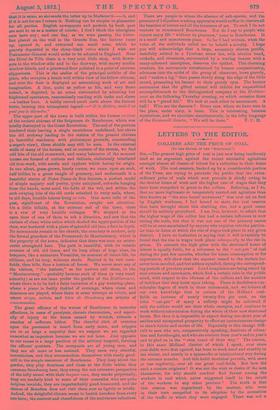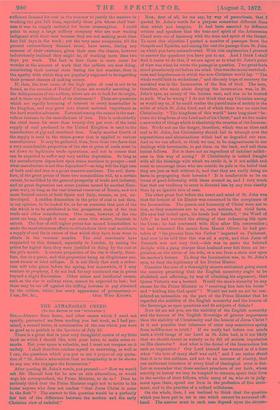LETTERS TO THE EDITOR.
COLLIERS AND THE PRICE OF COAL.
[To rue EDITOR OF THE "SPRCTATOR:1 SIR,—The present high price of coal is just now being insidiously used as an argument against the recent successful agitations amongst almost all classes of labour for a reduction in their hours of work. The coal-masters, backed up by a considerable portion of the Press, are trying to persuade the public that the extra- ordinary price of coals which now prevails is chiefly owing to the shorter hours of work and the higher rate of wages that they have been compelled to grant to the colliers. Believing, as I do, that no more legitimate or temperately carried-out agitation than that known as "the nine hours' movement" was ever set on foot by English workmen, I feel bound to state the real reasons that have brought about this startling rise, lest a good cause should be unfairly prejudiced. I am free, however, to admit that the higher wage of the collier has had a certain influence in now raising the scale, but that it was not one of the primary causes will be at once ascertained by anyone who inquires into the particu- lar time or dates at which the rise of wages took place in any given district. I have no hesitation in saying that it will invariably be found that the rise in wages took place subsequently to the rise in prices. To connect the high price with the shortened hours of labour is equally futile, for a reference to the " out-put " of coal during the past few months, whether for home consumption or for exportation, will show that the amount raised to the surface has never been excelled, and but seldom equalled, during the correspond- ing periods of previous years. Loud complaints are being raised by coal owners and merchants, which find a certain echo in the public mind, with respect to the idleness of the colliers and the number of holidays that they insist upon taking. There is doubtless a con- siderable degree of truth in these statements, and we believe of our own knowledge that in certain of the Midland coal- fields an increase of nearly twenty-five per cent. on the total " out-put" of many a colliery might be achieved if only the colliers would use their whole energies, and continue to work without intermission during the whole of their now shortened hours. But then it is impossible to expect during one short year of sudden and unexpected prosperity to effect an instantaneous change in men's habits and modes of life. Especially is this change diffi- cult to men who are, comparatively speaking, destitute of educa- tion and forethought, and who are content from year's end to year's end to plod on in the " even tenor of their way." The custom, in this same Midland district of which I speak, ever since coal-fields were first opened, has been to work hard and steadily in the winter, and merely in a spasmodic or interjectional way during the summer months. And this habit doubtless prevails, with more or less regularity, over all our great coal-fields. But how did such a custom originate? It was not the wish or desire of the men themselves, for why should conduct find favour among the workers in coal which never suggested itself to the minds of the workers in any other produce ? The truth is that this custom was engendered by the masters, who were in their turn compelled to its adoption by the necessities of the traffic in which they were engaged. There was not a
sufficient demand for coal in the summer to justify the masters in working the pits full time, especially those pits whose chief busi- ness it was to supply material for house consumption. I could point to many a large colliery company who are now waxing indignant with their men because they are not making more than four full days in the week ; yet the very same companies, till the present extraordinary demand arose, have never, during any summer of their existence, given their men the chance, however industriously inclined they might be, of working more than two days per week. The fact is that there is more cause for wonder in the amount of work that the colliers are now doing, considering their normal state daring the hot weather, than in the apathy with which they are popularly supposed to be regarding their present chances of making money.
If, then, the true cause of the high price of coal is not to be found, as the enemies of Trades' Unions are roundly asserting, in the delinquencies of the colliers, where are we to look for its origin, and is there any likelihood of its abatement? These are questions which are rapidly becoming of interest to every householder in the kingdom, and may grow into almost national importance as the bard weather advances. Foremost among the causes is the mar- vellous increase in the manufacture of iron. This is undoubtedly the chief cause, for more than twenty-five per cent. of the total supply of coal produced in the United Kingdom is used in the manufacture of pig and merchant iron. Nearly another fourth of the supply is used in the steam-power that is applied to various manufactures. It may be gathered, then, from these two facts that a very considerable proportion of the rise in price of coals must be set down to legitimate trade operations, and not to causes that can be expected to suffer any very sudden depression. So long as the manufactures dependent upon steam continue to prosper—and what manufacture is not thus dependent?—so long will the high rate of both coal and iron in a great measure continue. The evil, there- fore, of the great prices of these two commodities will, to a certain extent, be modified by the general prosperity of trade and industry, and no great depression can occur (unless caused by another Euro- pean war), so long as the vast internal resources of Russia, and to a more limited extent of both Spain and Italy, remain, as yet, un- developed. A sudden diminution in the price of coal is not then, in my opinion, to be looked for, so far as concerns that part of the rile which is to be attributed to the prosperous state of the iron trade and other manufactures. One cause, however, of the rise must ere long, though it may not come this winter, diminish in extent. The fear of still higher prices has caused householders to make the most strenuous efforts to obtain from their coal merchants a supply of coal far in excess of that which they have been wont to obtain in the summer months. The coal merchants have responded to this demand, especially in London, by raising the prices far higher than they were justified in doing by the cost at the pit's mouth. A certain proportion of the rise is clearly, there- fore, due to a panic, and this proportion being an illegitimate one, must sooner or later collapse. It is not likely that such-a reduc- tion will take place before the spring, but meanwhile, if I may venture to prophecy, I do not look for any continued rise in prices beyond a slight fluctuation. Other minor and incidental causes, such as the rise in railway rates, cannot be expected to last ; but these may be set off against the trifling increase in pay obtained by the colliers, which has every appearance of permanency.—



































 Previous page
Previous page